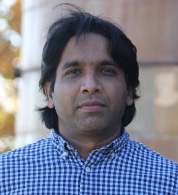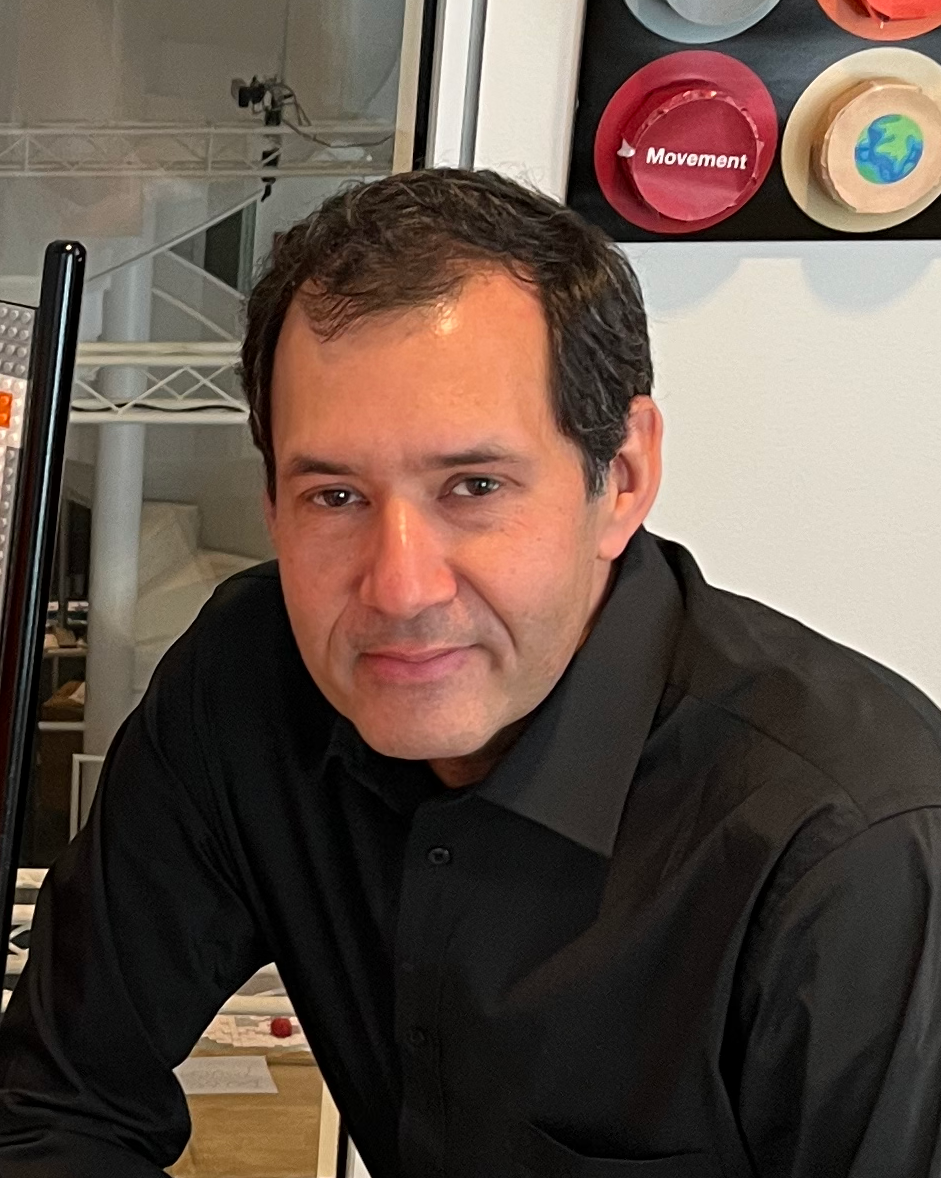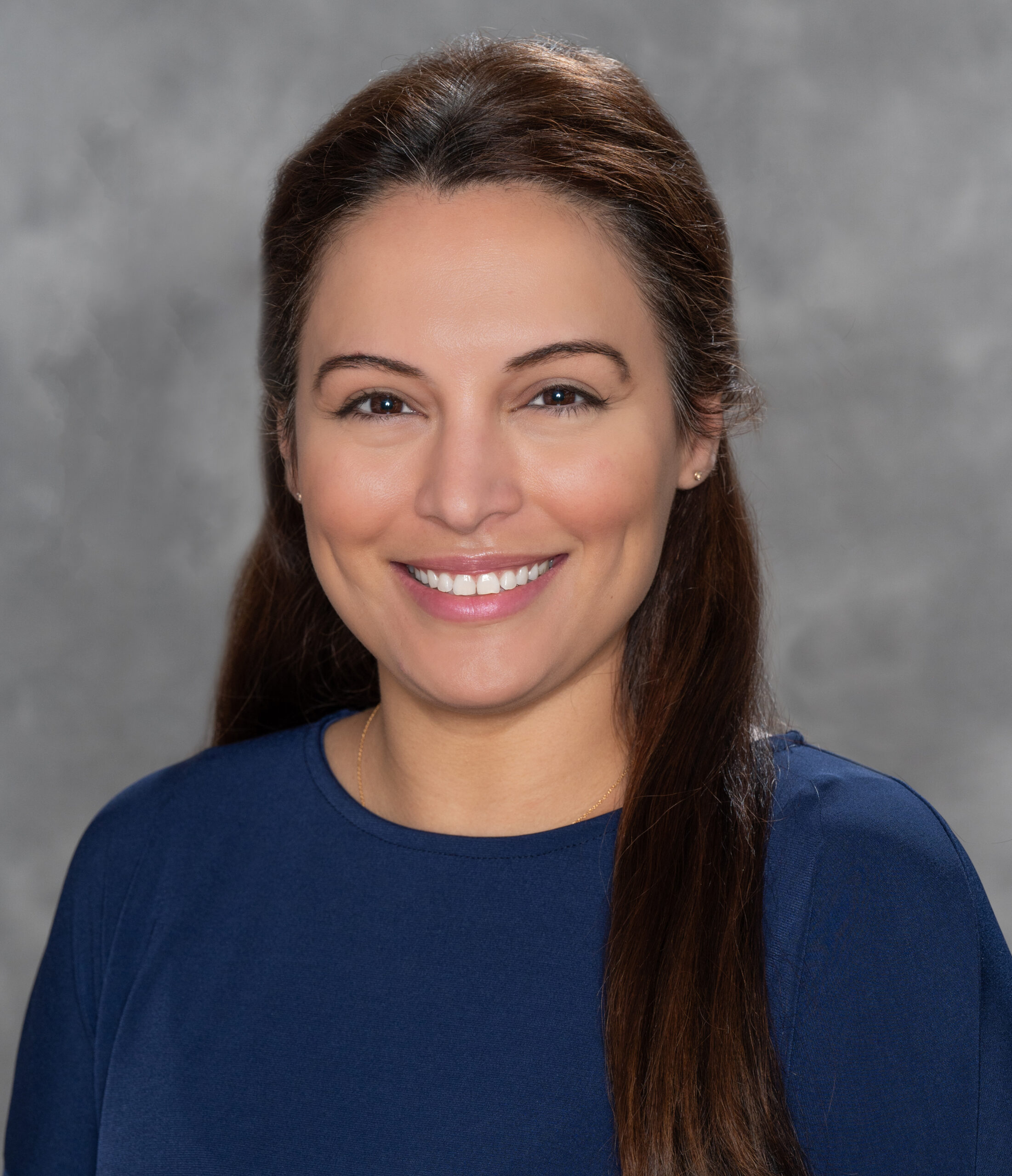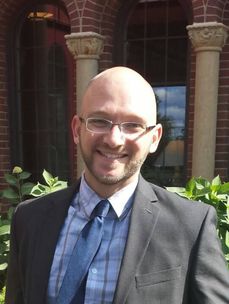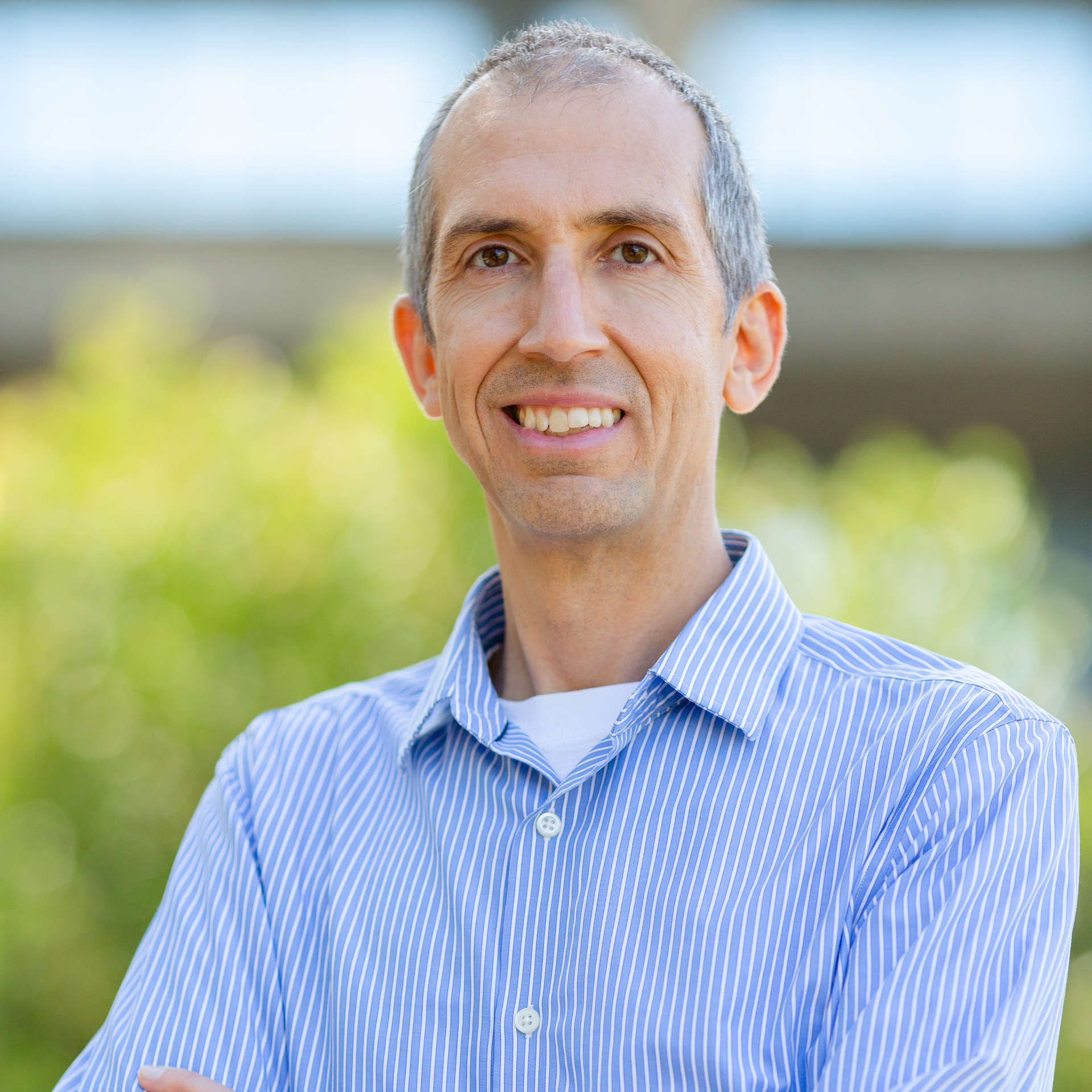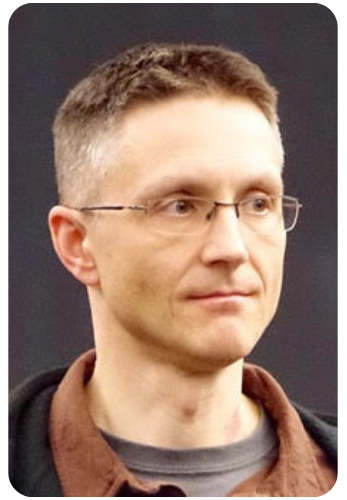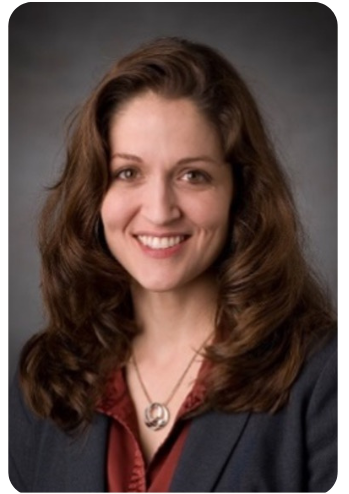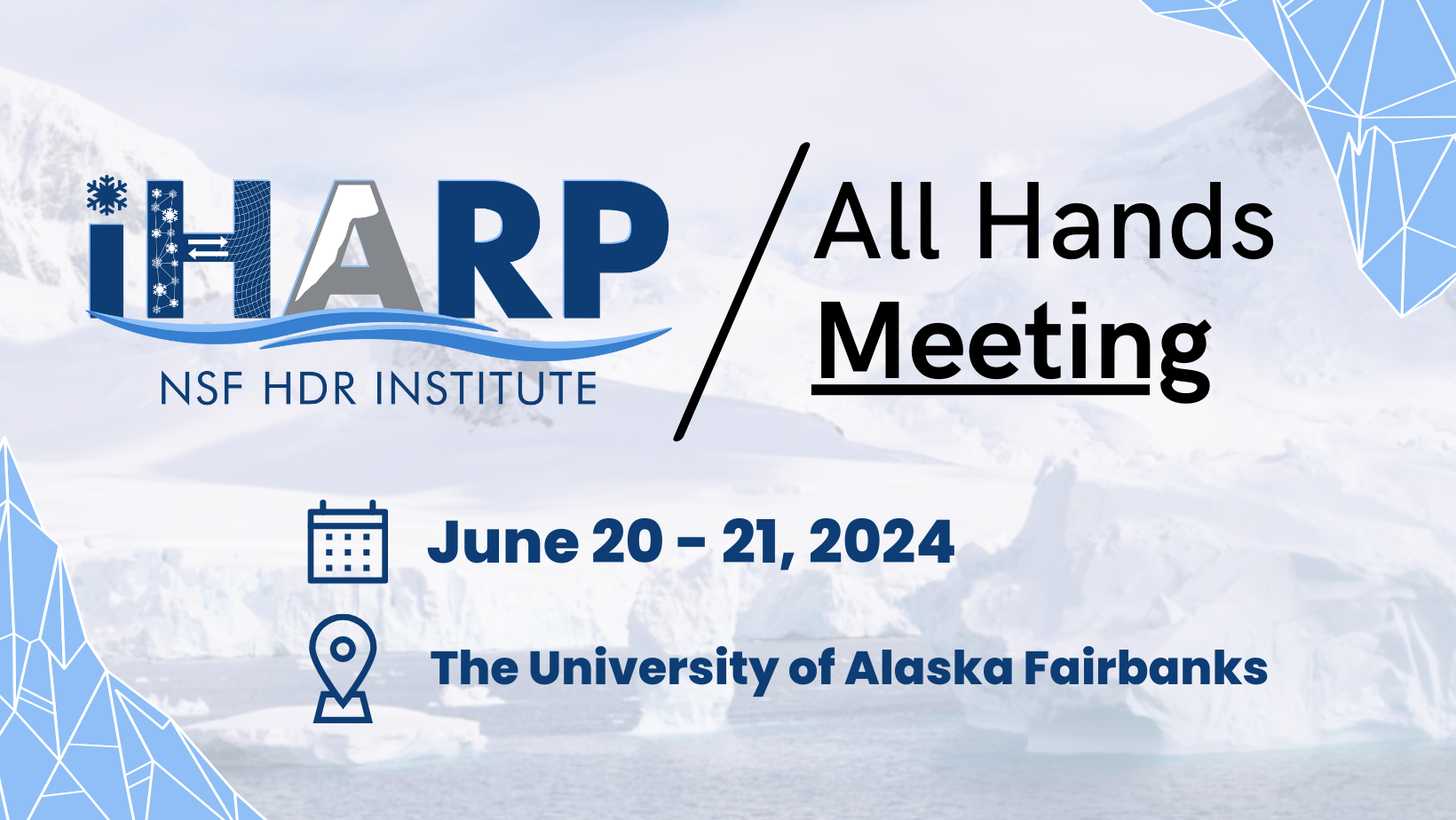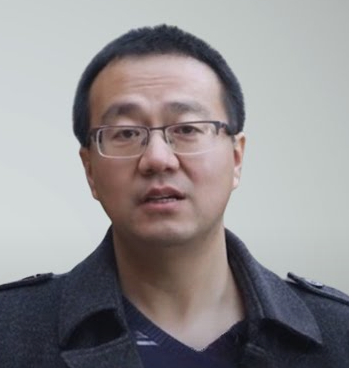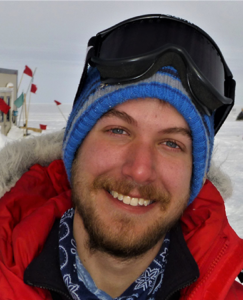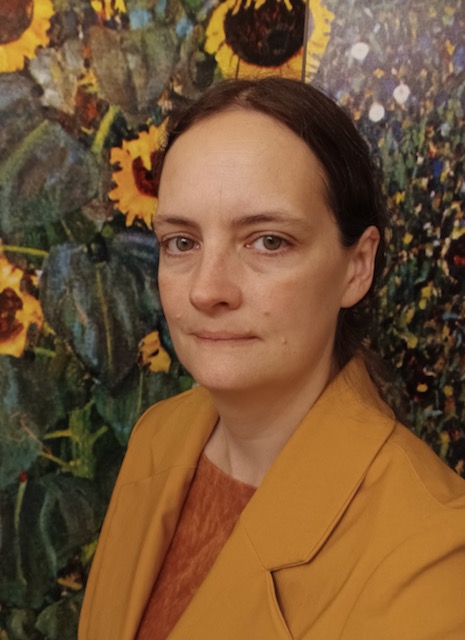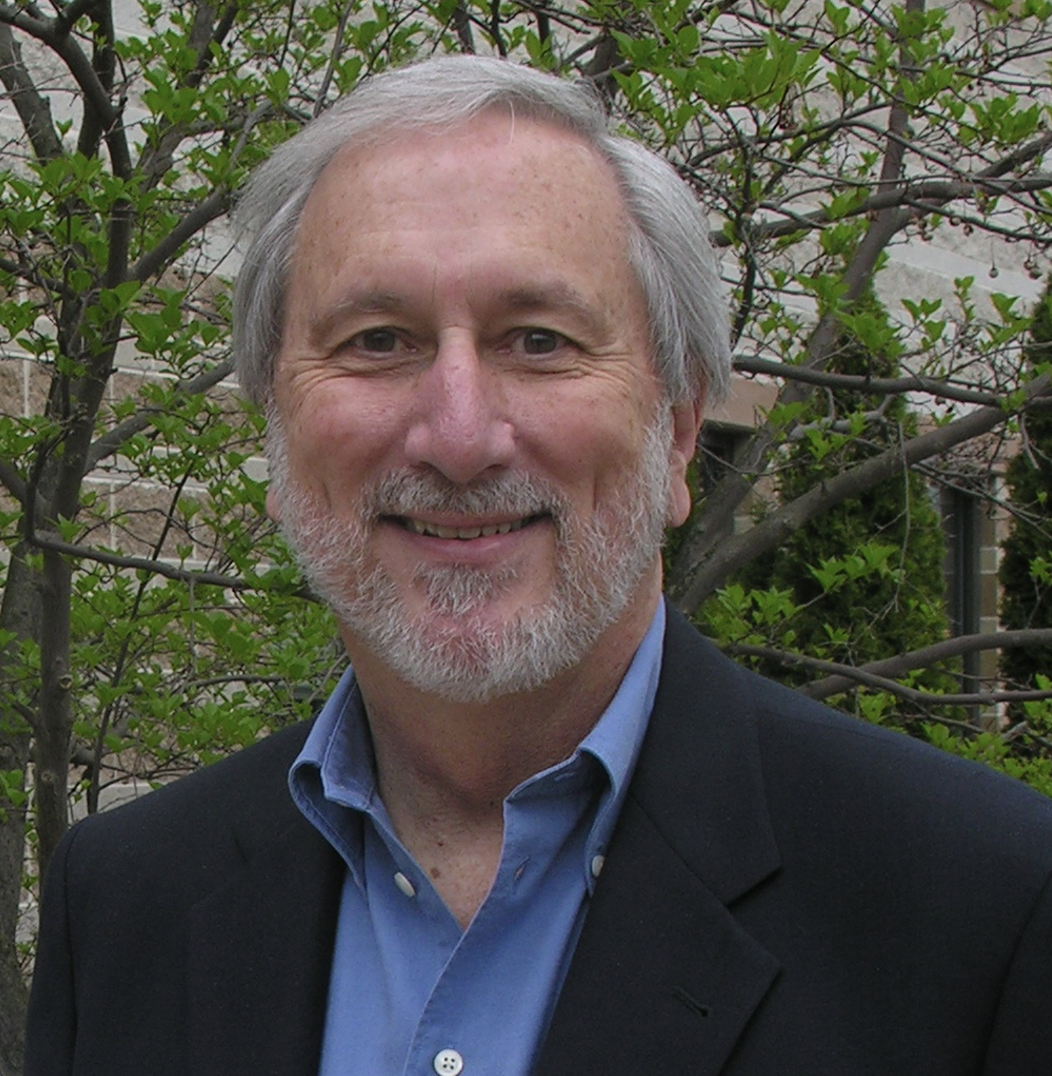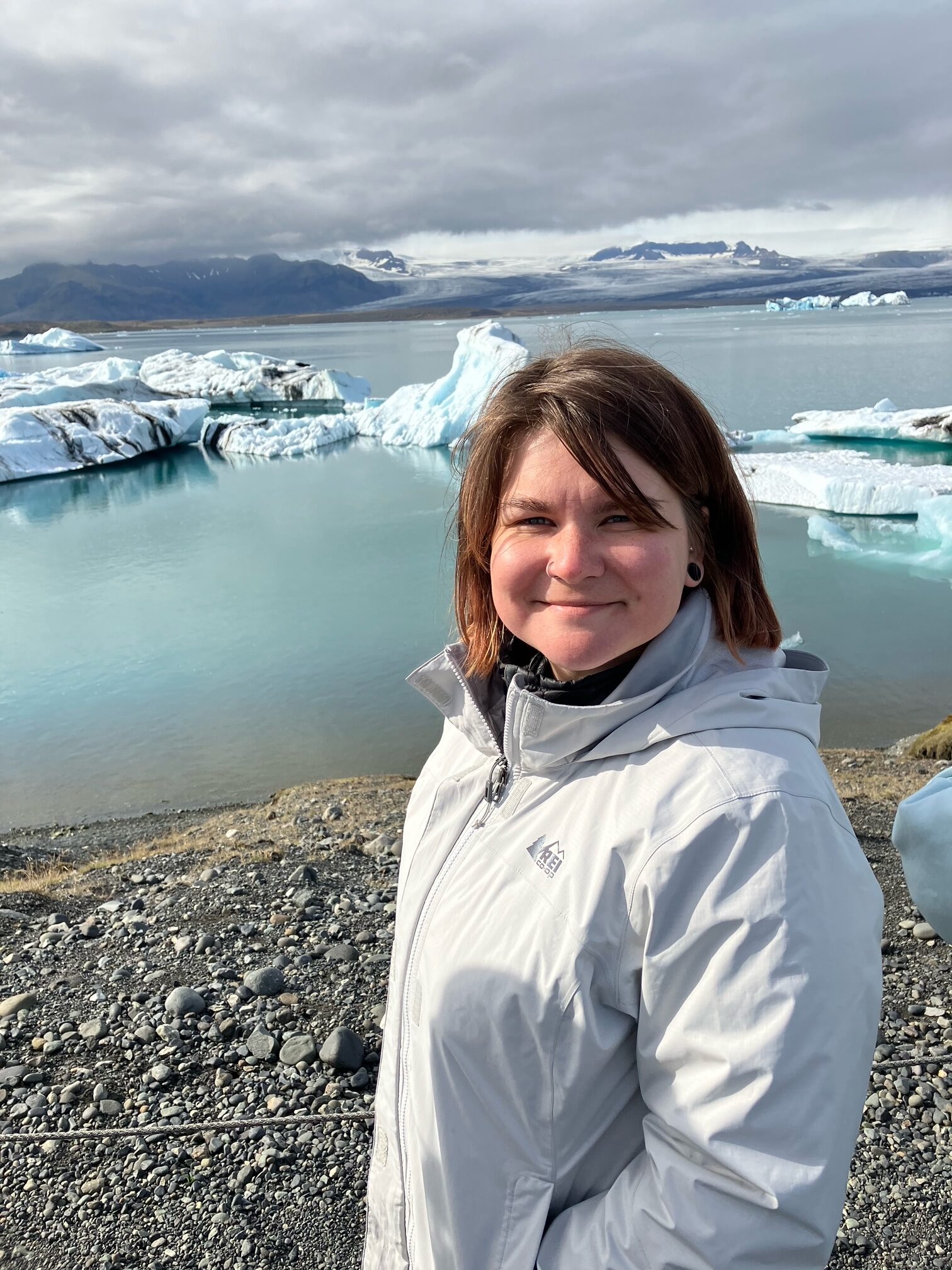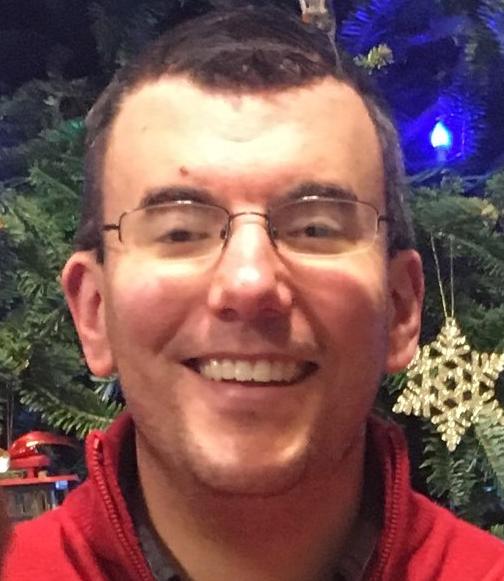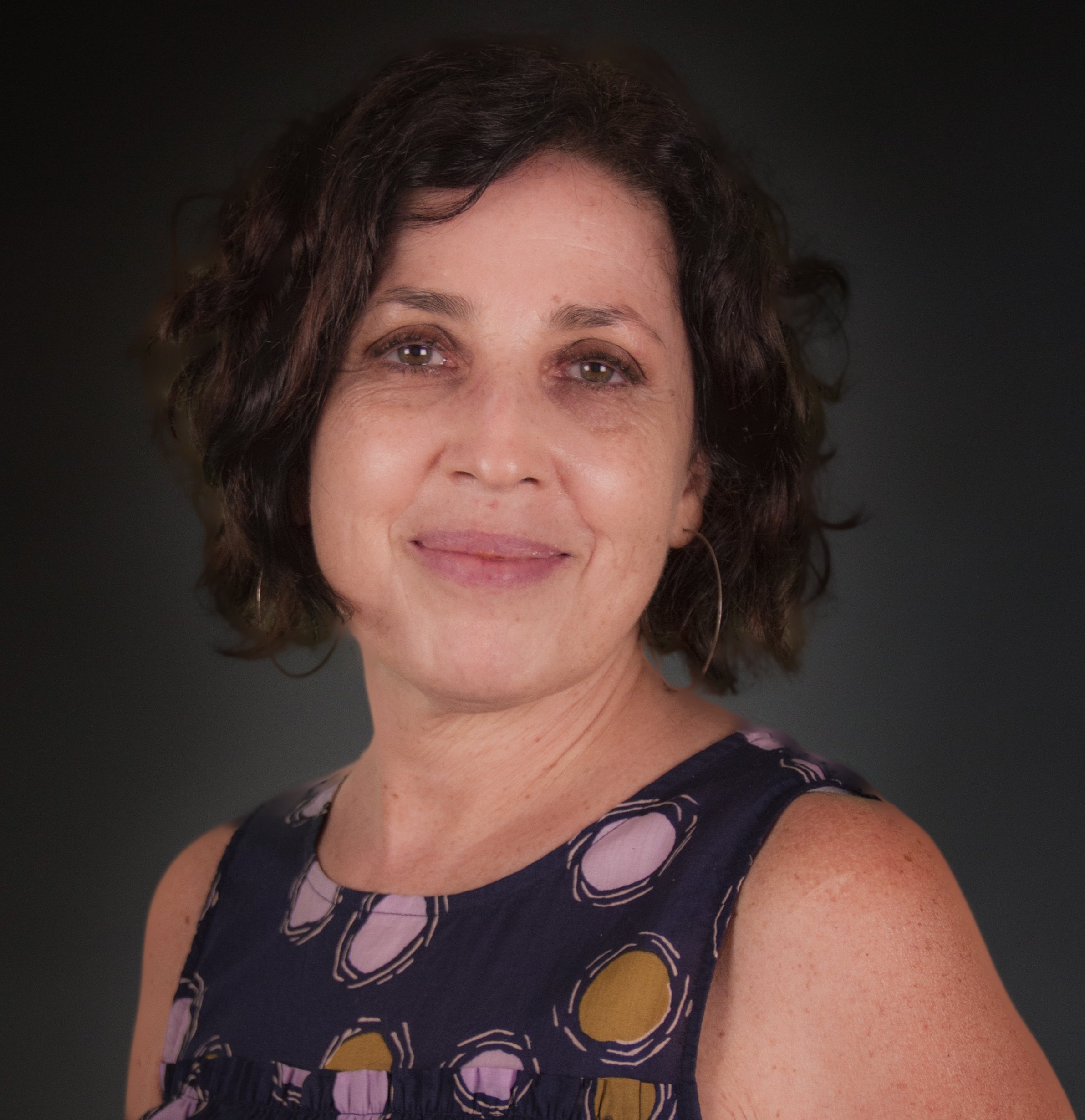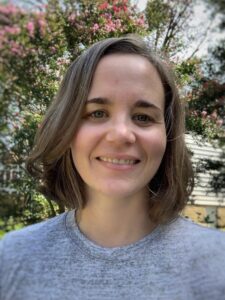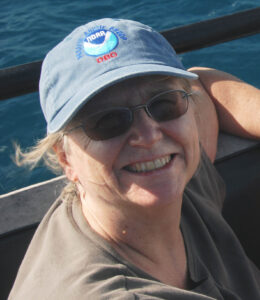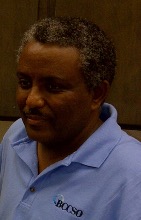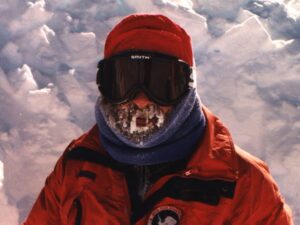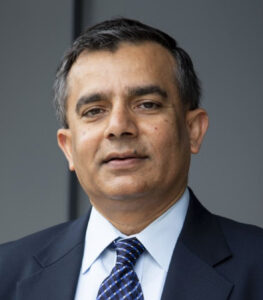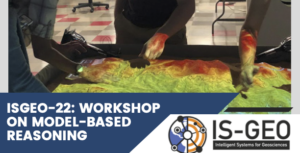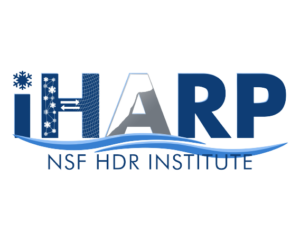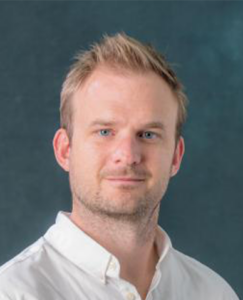iHARP -> Events
Last updated 2025 May 1
Want to stay informed about our upcoming webinars?
Sign up today and join us on our monthly Talk Tuesdays where we host guest speakers.
Talk Tuesdays will occur once a month and will take place at 4p (EST) unless noted.
The above button will take you to a Google form to complete the subscription signup process.
Upcoming Virtual Events
All times listed are eastern standard time unless noted
- Tuesday, May 13, 2025 at 4p: Dr. Aaron Deslatte (O’Neill School of Public and Environmental Affairs at Indiana University Bloomington & Metropolitan Governance and Management Transitions Laboratory) | Building Knowledge Infrastructure Systems Through University-Supported Climate Collectives
- Tuesday, May 20, 2025 at 4p: Dr. Mark Subbarao (lead, NASA’s Scientific Visualization Studio) | Designing visualizations for NASA’s Earth Information Center
- Tuesday, May 27, 2025 at 4p: Dr. Maria Molina (Department of Atmospheric and Oceanic Science at the University of Maryland, College Park) | Machine Learning Applied to Polar Regions and the Earth Systems
Tuesday, April 22, 2025 | 4p – 5p | Dr. Chandi Witharana
High-resolution Arctic Built Infrastructure and Terrain Analysis Tool (HABITAT)
Speaker: Dr. Chandi Witharana, Assistant Professor at University of Connecticut in the Department of Natural Resources & the Environment
click the above button to join the event via Webex
Talk Abstract
There is an urgent need for advanced monitoring tools to accurately map Arctic permafrost landforms and thaw-related disturbances, track their evolution over time, and assess their economic impacts on human-built infrastructure. Over the past two decades, the entire Arctic has been repeatedly imaged by sub-meter resolution Maxar satellite sensors, resulting in data repositories containing millions of images and growing into the petabyte scale. Despite this wealth of data, geospatial products derived from imagery at a pan-Arctic scale remain rare. The challenge of scaling automated analysis across millions of square kilometers of heterogeneous Arctic landscapes underscores the demand for high-throughput data science pipelines. To address this gap, we developed the High-resolution Arctic Built Infrastructure and Terrain Analysis Tool (HABITAT) – a novel image analysis pipeline that brings operational-scale GeoAI capabilities into Arctic science applications. We demonstrate HABITAT’s utility through multiple Maxar-based mapping efforts, such as ice-wedge polygons (IWPs), ice-wedge polygon capillary networks, retrogressive thaw slumps, and human-built infrastructure features. HABITAT is designed to run efficiently on heterogeneous high-performance computing systems. One of HABITAT’s key outcomes is the creation of the first pan-Arctic ice-wedge polygon dataset, comprising over one billion individual IWPs across the tundra domain.
Tuesday, May 13, 2025 | 4p – 5p | Dr. Aaron Deslatte
Building Knowledge Infrastructure Systems Through University-Supported Climate Collectives
Speaker: Dr. Aaron Deslatte, Associate professor in the O’Neill School of Public and Environmental Affairs at Indiana University Bloomington and co-director of the Metropolitan Governance and Management Transitions Laboratory
click the above button to join the event via Webex
Abstract
Knowledge-based organizational capabilities are critical for continued human development and flourishing in the Anthropocene. Population growth, spatial development, and unsustainable resource use are all driving a need for new and diverse forms of knowledge to adapt social and physical infrastructures to climate change-driven environmental hazards. Despite a vast and expanding scholarship on environmental impacts and policy interventions, scholars have devoted less attention to how political systems or complex organizations curate and translate knowledge into implementation guidance or practice. This article addresses this challenge by empirically exploring a concept called “knowledge infrastructure systems,” developed by interdisciplinary sustainability scholars to broaden analytic attention to the methods by which organizations and resource users mobilize knowledge into practice. State and local governments are on the front lines of the implementation of many national climate policies. Yet, climate vulnerabilities and organizational capacities for planning and implementing innovative programs vary significantly between regions and between rural-suburban-urban divides. While an influx in federal funds for climate work in the United States has increased opportunities for local communities, the successful implementation of these intergovernmental programs is challenged by the limited capacity of the very communities these funds aim to support. Through an analysis of text and interview data, this article examines the capacity-building efforts and roles that university-based collaborative networks played in the rollout of one federal initiative, the Climate Pollution Reduction Grant Program, and the disparate distribution of benefits which resulted from this effort. We argue that greater attention to capacity-building and “knowledge infrastructure” is necessary to leverage funding opportunities for the equitable delivery of climate services.
Tuesday, May 20, 2025 | 4p – 5p | Dr. Mark Subbarao
Designing visualizations for NASA’s Earth Information Center
click the above button to join the event via Webex
Talk Abstract
Tuesday, May 27, 2025 | 4p – 5p | Dr. Maria J. Molina
Machine Learning Applied to Polar Regions and the Earth Systems
Speaker: Dr. Maria J. Molina, Assistant Professor within the Department of Atmospheric and Oceanic Science at the University of Maryland, College Park
click the above button to join the event via Webex
Abstract
Polar regions are undergoing rapid and unprecedented change, with profound implications for the Earth systems. This seminar will explore how machine learning transforms our understanding of these remote and complex environments. From uncovering trends in Antarctic polynyas to disentangling links between polar processes and broader Earth system predictability, recent advances, methods, and opportunities for interdisciplinary collaboration will be discussed. This talk will also discuss how generative AI can accelerate research progress and facilitate classroom learning, and where AI can go wrong for scientific applications.
Past Events
Tuesday, April 8, 2025 | 4p – 5p | Dr. Eric Stokan
Transdisciplinary Collaborations to Address Our “Wicked Problems”
Speaker: Dr. Eric Stokan, Director of the Center for Social Science Scholarship (CS3), an associate professor of political science, and an affiliate faculty in the School of Public Policy at UMBC
Talk Abstract
This talk centers on building successful collaborations and partnerships to address the “wicked problems” we face within and across our communities. From developing strategic plans aimed at mitigating flooding to building alternative energy infrastructure, overcoming our disciplinary boundaries and leveraging knowledge across our colleges, institutions, and communities is an important pathway to addressing the most pressing challenges we face today.
The Director of the Center for Social Science Scholarship (CS3), Dr. Eric Stokan, will describe and highlight the results of partnerships between CS3 and COEIT and iHarp, the Metropolitan Governance and Management Transitions (MGMT) lab at IU Bloomington, and others. The talk will reflect on the results and outcomes of these collaborations.
The second part of the talk will highlight opportunities for increased engagement with social scientists and humanists and supports to make this happen. Drawing on social science and public management theory, this talk will make the case that finding these points of collaboration are increasingly important and necessary for the challenges ahead.
Tuesday, February 18, 2025 | 4p – 5p | Dr. Jennifer (Jen) Delamere
Eyes Over Alaska: How JPSS Satellites See the 49th State
Speaker: Dr. Jennifer (Jen) Delamere, Director of Geographic Information Network of Alaska (GINA) at the University of Alaska Fairbanks, Associate Research Professor (Snow, Ice, and Permafrost Group at the Geophysical Institute)
Talk Abstract
Suomi-NPP, NOAA-20, and NOAA-21, and the innovative instruments they carry, are the most versatile observational assets we have for weather forecasting and hazard detection in the state of Alaska and its adjacent oceans. These satellites, part of the Joint Polar Satellite System (JPSS), are equipped with direct-broadcast technology, allowing continuous downlink of mission data to small antennas worldwide. Three direct-broadcast antennas, owned and operated by the Geographic Information Network of Alaska (GINA), are currently deployed in interior Alaska. This presentation will highlight how JPSS products are used today in Alaska to monitor wildland fires by the Alaska Fire Service, river flooding by the Alaska-Pacific River Forecast Center, precipitation by the National Weather Service offices, and sea ice movement by the Alaska Sea Ice Program. As important as the mission are the people that make them happen. GINA continually strives to develop, improve, and assess satellite products through partnerships with NOAA, NOAA Cooperative Institutes, government agencies, and universities. Examples of these partnerships will be presented.
Full-Cirlce Climate Communications Workshop
- Workshop Dates: January 13 – 17, 2025 (minimum 3-day commitment required for participants)
- Location: University of Maryland, Baltimore County (UMBC)
- Cost: There is no cost for the workshop. Travel and lodging expenses will be covered for non-iHARP scientists and non-UMBC participants traveling for the workshop.
Click here to navigate to the Full-Circle Climate Communications Workshop webpage for additional information, including how to express interest in attending.
Tuesday, December 3, 2024 | 4p – 5p | 3rd Annual Fireside Chat: Making Effective Presentations
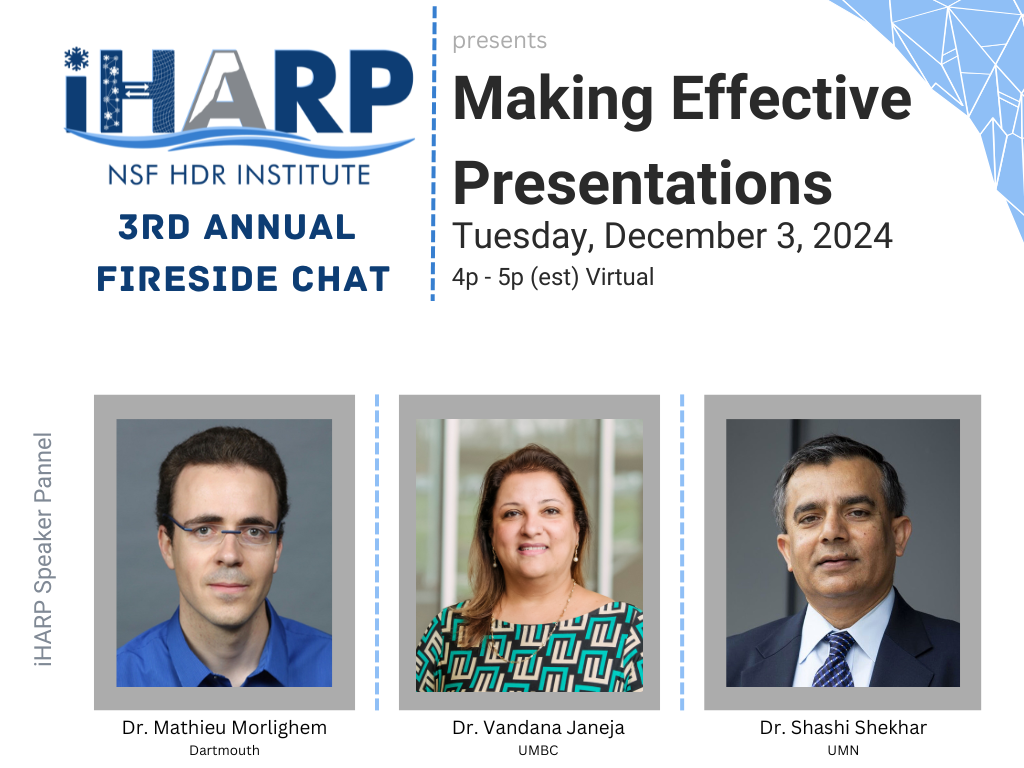
Come, relax, and join us for an engaging informal conversation with leading scientists and researchers. Learn how they create effective presentations to communicate their research and ideas. We will cover their struggles and successes and their tips and tricks that have made them successful.
Bring a warm drink and snacks, and cozy on up to the virtual fireside for our last 2024 Talk Tuesday event.
iHARP Senior Research Panel Includes:
Dr. Vandana Janeja, UMBC — Associate Dean for Research and Faculty Development, Professor in Information Systems Department, PI & Director NSF HDR Institute – iHARP
Dr. Mathieu Morlighem, Dartmouth — Professor in the Department of Earth Sciences at Dartmouth College, iHARP Co-PI & Co-Director
Dr. Shashi Shekhar, UMN — Professor, Distinguished McKnight University Professor, Distinguished University Teaching Professor, ADC/CSE Chair, AI-CLIMATE Institute Director, iHARP Co-PI
Tuesday, November 12, 2024 | 4p – 5p | Dr. Lora Harris
Expanding the spaces and places for geoscience through equitable exchange with communities
Speaker: Lora Harris (she/her) is a professor and associate director of research at the Chesapeake Biological Laboratory within the University of Maryland Center for Environmental Science
Talk Abstract
The Active Societal Participation In Research and Education (ASPIRE) program seeks to expand the places and people involved in meeting challenging environmental and climate change issues through supporting and encouraging geoscience research co-managed by scientists and community members. The vision of ASPIRE is that supporting place-based, community-based work will simultaneously attract, recruit, and retain a wider diversity of early career scientists in Geoscience, as well as strengthen public trust in Geoscience to address the local-to-global environmental issues threatening our world. ASPIRE recognizes that the urgency of these issues means work to develop geoscientist leaders must be accompanied by meaningful and equitable exchange with under-resourced and minority communities that have often been left out of environmental research and solutions. There is a documented tendency in the sciences to discount the experiences, knowledges, perspectives and priorities of non-dominant communities. The ASPIRE program outlines a mechanism for transformation of the Geosciences that reverses institutional discounting of non-dominant priorities, and supports and elevates asset-based framing of community cultural capital. This project continues work to understand geoscience boundary spanners who “have a foot in both worlds” of mainstream geoscience and community.
Tuesday, Ocotober 29, 2024 | 4p – 5p | Kevin Coakley
ML Reproducibility: Sources of Algorithmic, Implementation, and Observational Variability
Speaker: Kevin Coakley, Computational and Data Science Research Specialist at the San Diego Supercomputer Center and UC San Diego
Talk Abstract
Reproducibility is fundamental to scientific research, as it underpins trust, progress, and credibility. In machine learning (ML), achieving reproducibility is difficult due to variability in algorithms, implementations, and observational factors. This presentation explores key contributors to irreproducibility in ML, including algorithmic factors like hyperparameter tuning and random weight initialization, implementation differences in software and hardware, and observational factors such as dataset bias and data preprocessing. It emphasizes the need to view ML model performance as a distribution, not a single metric or average of results, and clarifies the difference between reproducibility and portability. The goal is to guide researchers on improving ML reproducibility and identifying the critical information necessary for replicating experimental outcomes.
Tuesday, October 8, 2024 | 4p – 5p | Dr. Anthony Arendt
Open Science Practices in Support of Arctic Research Applications
Speaker: Dr. Anthony Arendt, Senior Data Science Fellow and the Director of Community Engagement at the University of Washington’s eScience Institute
Talk Abstract
The practice of open science, with its focus on data sharing, reproducibility and co-development of software, has the potential to accelerate and improve the quality of our research. In this talk I will share lessons we have learned in fostering open science communities engaged in Arctic research. I will link these efforts to ongoing research within iHARP and offer some best practices that support continued collaboration, data sharing and model development. Topics will include the creation of cloud computing infrastructure, open science training and skills development, community engagement and research software design.
Tuesday, September 17, 2024 | 4p – 5p | Dr. Rachel Brennan
Drawdown and Effective Science Communication Strategies
Speaker: Rachel Brennan, Ph.D., P.E. is a Professor and Interim Associate Head of Civil and Environmental Engineering at Penn State University.
Talk Abstract
There are many proven methods of reducing and reversing greenhouse gas (GHG) concentrations in our atmosphere, spanning technological, ecological, and social solutions across all sectors of the economy and society. Among various efforts, the organization Project Drawdown has taken a particularly impressive first step toward identifying, modeling, and ranking strategies that can significantly reduce GHGs and reverse global warming when implemented at scale. Penn State University and Project Drawdown are working collaboratively together to advance strategies to reverse global warming with a focus on contextual systems research and effective science communication techniques to make this work easily accessible to the public. One aspect of this partnership is the Drawdown Scholars Program which trains diverse cohorts of undergraduate students to become informed climate action leaders who are adept at both climate solutions and effective science communication. In this presentation, an overview of Project Drawdown, the Drawdown Scholars program, and tips for delivering engaging, dynamic, and memorable presentations will be shared
Tuesday, August 20, 2024 | 4p – 5p | Dr. Benedikt Riedel
IceCube Science and Computing
Speaker: Dr. Benedikt Riedel, Computing Manager for the IceCube Neutrino Observatory and the Heterogeneous Systems Lead for the Accelerated AI Algorithms for Data-Driven Discovery, Pan-HDR Ice-Melt Community Council member
Talk Abstract
Overview of IceCube science goals and results with a special focus on computing intensive research.
Thursday, June 20 and Friday, June 21, 2024
Wednesday, May 1, 2024 | 12p – 1p (est) | Dr. Chang-Tien Lu
Spatiotemporal Event Forecasting in Social Media
Speaker: Chang-Tien Lu is a Professor and National Capital Region Program Director in the Department of Computer Science, Curriculum Lead in the Innovation Campus, and Associate Director of the Sanghani Center for AI and Data Analytics at Virginia Tech.
Talk Abstract
Social media has become a popular data source as a surrogate for monitoring and detecting events. Analyzing social media (e.g., tweets) to reveal event information requires sophisticated techniques. Tweets are written in unstructured language and often contain typos, non-standard acronyms, and spam. In addition to the textual content, Twitter data form a heterogeneous information network where users, tweets, and hashtags have mutual relationships. These features pose technical challenges for designing event detection and forecasting methods. In this talk, I will present the design and implementation of a fully automated forecasting system for significant societal events using open-source data including tweets, blog posts, and news articles. I will describe the system architecture, individual models that leverage specific data sources, and a fusion engine that supports the trade-off between specific evaluation criteria. I will also demonstrate its superiority and capability to forecast significant societal happenings.
Tuesday, April 16, 2024 | 4p – 5p (est) | Dr. Chaopeng Shen
Differentiable modeling for continental- and global-scale water sciences
Speaker: Chaopeng Shen is an Associate Professor in Civil Engineering at The Pennsylvania State University.
Talk Abstract
Process-based modeling offers interpretability and physical consistency in many domains of geosciences but struggles to leverage large datasets efficiently. Machine-learning methods, especially deep networks, have strong predictive skills yet are unable to answer specific scientific questions or elucidate physical processes. A recently proposed genre of physics-informed machine learning, called “differentiable” models (https://t.co/qyuAzYPA6Y), connect neural networks (NNs) with process-based equations (priors) to benefit from the best of both NNs and process-based modeling paradigms. We propose that differentiable models are especially suitable for flood forecasting as well as continental- or global-scale water sciences. They can harvest information from big earth observations to produce state-of-the-art predictions that supercede purely data-driven models, enable physical interpretation naturally, extrapolate well (due to physical constraints) in space and time, and leverage progress in modern AI computing architecture and infrastructure. Differentiable models can also synergize with existing hydrologic models, learn from the lessons of the community and distinguish better priors. We demonstrate the power of differentiable modeling using computational examples in rainfall-runoff modeling, flood forecasting, river routing, as well applications in water-related domains such as ecosystem modeling and water quality modeling. Furthermore, we show how differentiable modeling can enable us to ask fundamental questions in water sciences, ecohydrology, and water quality.
Wednesday, April 10, 2024 | 12p – 1p (est) | Dr. Raji Vatsavai
GeoAI for Social Good
Speaker: Dr. Raju Vatsavai is Chancellor’s Faculty Excellence Program Cluster Professor of Geospatial Analytics in the Department of Computer Science at North Carolina State University (NCSU).
This meeting was not recorded
Talk Abstract
Several decades of research have led to current advances in artificial intelligence (AI), specifically machine learning (ML) and deep learning (DL). These advancements hold promise for solving major challenges facing human society – from mitigating climate change to increasing food production, designing smart cities, and optimizing scarce resources. All these problems share a common thread: they are inherently rooted in space and time. Remote sensing data serves as a prime example of spatial big data. NASA recently collected its 10 millionth Landsat image. The coarse-resolution (30 m) Landsat collection itself surpasses a petabyte in size, while private satellite data producer MAXAR holds more than 125 petabytes of high-resolution data. Applications such as disease mapping, crop monitoring, and urban studies all rely on this data. We present recent advances in GeoAI that analyze these multimodal datasets and show their applications in various fields, including climate-smart agriculture, slum mapping, and critical infrastructure monitoring.
Tuesday, March 26, 2024 | 4p – 5p (est) | Dr. Nick Holschuh
Notes from the field: an overview of the motivation-for and approach-to ice penetrating radar data collection at Thwaites Glacier, West Antarctica
Speaker: Dr. Nick Holschuh is an Assistant Professor of Geology at Amherst College, iHARP Researcher
Talk Abstract
Changes to the ocean, in part driven by our emissions of CO2, have caused the acceleration of ice flow in West Antarctica. This enhanced discharge has resulted in a net mass loss from the Antarctic ice sheet, which contributes ~0.5 mm/a to global sea level rise. Thwaites Glacier, which sits in a deep marine basin in West Antarctica, is thought to be unstable in the face of ocean warming, but the rate and magnitude of ice loss there depends on unknown material properties of the glacier substrate. In his talk, Dr. Holschuh will discuss a geophysical campaign conducted on Thwaites Glacier during the 2023/24 Austral Summer, designed to constrain models of ice flow over the coming century. This will include an overview of ice penetrating radar, a discussion of the challenges in automated interpretation of ice penetrating radar data, and a description of the logistics-for and experience-of collecting data on one of Earth’s most rapidly changing glaciers.
Arctic OSSEs and Beyond
Speaker: Dr. Nikki Privé is an Associate Research Scientist at Morgan State University with GESTAR-II as a cooperative agreement employee with NASA Goddard Space Flight Center
Please click the button above to watch the presentation recording.
Talk Abstract
Observing System Simulation Experiments (OSSEs) are a type of digital twin framework used to simulate the potential impact of future observing networks on numerical weather prediction. This talk will give an overview of how data assimilation and OSSEs work, along with best practices for designing and conducting OSSEs. Available products and resources for building an OSSE framework will be described. Some challenges particular to developing OSSEs for polar regions will also be discussed.
Tuesday, December 19, 2023 | 4p – 5p (est) | iHARP Researchers
iHARP 2nd Annual Fireside Chat
iHARP Researchers: Drs. Don Engel (UMBC), Sharad Sharma (UNT), Christopher Shuman (UMBC , NASA Goddard Space Flight Center) and Devon Dunmire (Uni. of Colorado Boulder)
This meeting was not recorded
Talk Abstract
Do you have an interest in Data, Polar, or Climate science and have questions for iHARP researchers? Now is your chance to ask questions and learn from the experts. You can submit a question in advance by completing the Google Form which can be found by clicking here. Please submit your question(s) by Monday, December 18th. Didn’t get your question in on time, don’t fret, we will take questions through out the chat.
Come, relax, and join us for an engaging informal conversation with leading scientists and researchers. This is your chance to ask the experts about their research.
Bring a warm drink and snacks, and cozy on up to the virtual fireside for our last 2023 Talk Tuesday event.
*Please note this event will not be recorded*
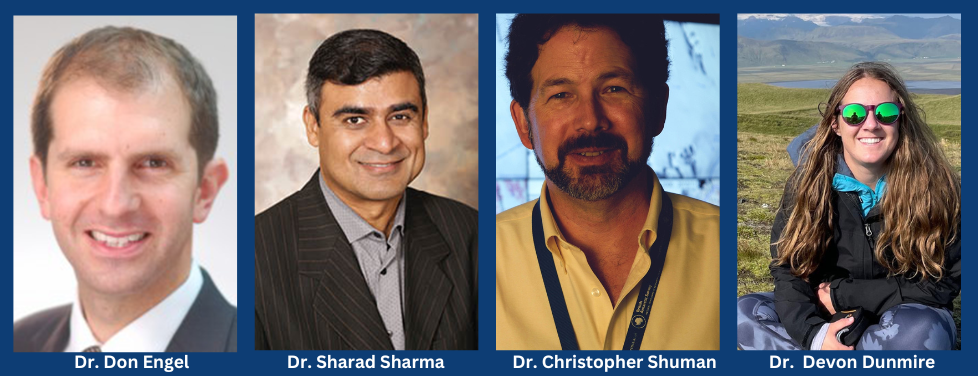
Tuesday, November 14, 2023 | 4p – 5p (est) | Dr. Xavier Soria Poma
Exploring low level image processing to boost middle and high-level computer vision tasks
Speaker: Dr. Xavier Soria, Research Scientist, Adjunct Professor at the National University of Chimborazo, and an Associate Researcher at the ESPOL Polytechnique University
Please click the button above to watch the presentation recording.
Talk Abstract
Since the advent of automatic image processing in the 60s of the 20th centuries, enormous advances have been made. Several fields have made use of computer vision and image processing tasks as a result of these breakthrough topics, from smile detection in smartphone’s cameras to space exploration in the vast universe. The first part of this presentation will introduce low-level image processing from the very beginning. I will briefly summarize the image edge detection task, highlighting current investigation and advances in this field. Secondly, I will present the contribution of my team in the edge detection domain; particularly, I will focus on how we see the problem and what advantages our proposal has over existing state-of-the-art models. Finally, I will show how edge detection boosts and improves work in different fields, such as breast cancer detection, calculation of ice sheet thickness from radar images and so on. All the models and datasets presented in the talk are freely available.
Tuesday, October 31, 2023 | 4p – 5p (est) | Dr. Donald Friedrich Boesch
Keeping Our Heads Above Water: Periodic Updating of Science-Based Sea-Level Rise Projections for Planning in Maryland
Speaker: Donald Friedrich Boesch, Ph.D. is President Emeritus and Professor Emeritus of the University of Maryland Center for Environmental Science (UMCES)
Please click the button above to watch the presentation recording.
Talk Abstract
As part of its efforts to address the climate crisis, the State of Maryland, with its 3,190 miles of shoreline and extensive low-lying coastal land, has, beginning in 2008, used sea-level rise projections in its planning. In 2015 the University of Maryland Center for Environmental Science was legally directed to update these projections at least every five years, with the latest projections produced in June 2023. Because it is important that projections have a solid scientific basis, we have used IPCC Assessments as the foundation, with the most recent projections relying on the Sixth Assessment Report (AR6). For the first time, the IPCC included Low Confidence projections that include unexpectedly rapid polar ice sheet loss, in addition to its Medium Confidence projections. Location specific, probabilistic projections based on the IPCC emissions pathway scenarios are provided through 2150 by NASA’s Sea Level Projection Tool. These projections include the effects of sterodynamic sea level and losses from water storage on land, glaciers, Greenland and Antarctica, in addition to local vertical land motion. We focused on a moderately mitigated emissions pathway (SSP2.4.5) based only on current commitments as the most plausible representation of the coming century, but also include estimates based on doubling of emissions by the end of this century (SSP3-7.0) and achieving the <2°C Paris Agreement goal (SSP1-2.6). These projections, along with extrapolations of tide gauge and satellite observations, indicate that relative sea-level rise will likely be between 0.3 m and 0.5 m by the middle of the century (from a 2005 base), beyond which the pathway of greenhouse gas emissions will have an increasingly significant influence, with polar ice sheet contributions growing if emissions are not reduced sufficient to meet the 2°C warming target. Under the current commitments only pathway, the best estimate of sea-level rise in Maryland in 2100 is 0.8 m, with the likely range of 0.6 to 1.1 m. Even with exceptionally rapid ice loss, it is very unlikely that it would exceed 1.5 m. Probability levels associated with these projections will be used as reference points for planning for both the natural and built environment.
Tuesday, October 10, 2023 | 4p – 5p (est) | Dr. Yiqun Xie
Harnessing AI Challenges for Earth Science Problems: From Space to Physics
Speaker: Dr. Yiqun Xie, Assistant Professor in Geospatial Information Science at the University of Maryland
Please click the button above to watch the presentation recording.
Talk Abstract
Advances in deep learning have continued to set new expectations for general tasks (e.g., computer vision, natural language processing) and bring new potential to harness geospatial big data for Earth Science problems. However, direct applications of deep learning often fall short due to challenges posed by geospatial data, including spatial heterogeneity/variability, sparse labels, etc. This talk will start with two general frameworks that explicitly tackle the challenges with: (1) A heterogeneity-aware framework that automatically recognize and handle spatial variability during model training; and (2) A physics-informed meta-learning framework that learns to select ensembles of physical models to assist training and reduce the need of labeled data. Then, the talk will show several examples of use-inspired AI for Earth Science, with applications in ICESat-2 height interpolation, global ecosystem model approximation, and label-free cloud masking. Finally, I will discuss our recent work on a coincidental data discovery platform to facilitate Arctic research.
Tuesday, September 26, 2023 | 4p – 5p (est) | Dr. Sophie Goliber
Ghub: A science gateway for unifying ice sheet science and education
Speaker: Dr. Sophie Goliber, Postdoctroal researcher at University at Buffalo, Buffalo NY
Please click the button above to watch the presentation recording.
Talk Abstract
The urgency in reducing uncertainties of near-term sea level rise relies on improved modeling of ice sheet response to climate change. Predicting future ice sheet change requires a tremendous effort across a range of disciplines in ice sheet science, including expertise in observational data, paleoglaciology, numerical ice sheet modeling, and the widespread use of emerging methodologies for learning from the data. However, significant knowledge and disciplinary barriers make collaboration between data and model groups the exception rather than the norm. We seek to improve the efficiency in collaboration among traditionally disparate approaches to this problem. We present Ghub, a community-building scientific and educational cyberinfrastructure that includes models and data processing tools, online simulation, and collaboration support, available for use at theghub.org. Ghub enables collaboration between ice sheet scientific communities and acts as a host for the open-source tools that are becoming more common in the field of ice sheet science. We provide an overview of the Ghub framework, with examples of tools, tutorials, and educational content that are ready to use, and visions for extending these and other upcoming developments. These tools target a wide range of audiences, ranging from ice sheet modeling community efforts such as the Ice Sheet Model Intercomparison Project for CMIP6 (ISMIP6) to more specialized process-orientated investigations. We also outline the process for scientists to host their data and tools on the platform.
Tuesday, August 15, 2023 | 4p – 5p (est) | Dr. Stephen Guimond
The Dynamics of Megafire Smoke Plumes in Climate Models: Why a Converged Solution Matters for Physical Interpretations
Speaker: Dr. Stephen Guimond, Associate Research Professor UMBC/JCET, NASA/GSFC
Please click the button above to watch the presentation recording.
Talk Abstract
As the climate system warms, megafires have become more frequent with devastating effects. A byproduct of these events is the creation of smoke plumes that can rise into the stratosphere and spread across the globe where they reside for many months. To gain a deeper understanding of the plume dynamics, global climate simulations of a megafire were performed at a wide range of grid spacings from 2.0° down to 7 km, including a 7 km nonhydrostatic experiment. The analysis focuses on how the resolved dynamics affects the specification of the plume characteristics such as injection height and black carbon (BC) mass. Prior studies initialize the smoke plume at one or a few grid points and this is shown here to produce severely dissipative dynamics. In order to validate such simulations with observations, enhancements of the plume characteristics to offset the dissipation is necessary. Using a numerically converged simulation, sensitivity tests show that to approximate the observed stratospheric lifetime, a reduction in BC fraction by 50% is necessary for external mixtures. The vorticity dynamics of the plume is also analyzed with a Lagrangian budget to understand the mechanisms responsible for the evolution of a collocated anticyclonic vortex. The results can be distilled down into a simple conceptual model. As the plume rises, the air diverges at the top of the updraft where the largest concentrations of smoke are found. This divergence induces a dilution of the background cyclonic absolute vorticity producing an anticyclonic vortex. Vortex decay occurs from opposite arguments.
To read the related research article please click here.
Tuesday, June 20, 2023 | 4p – 5p (est) | Maria Esteva
Share or Perish: Open Science, Open Data and What it All Means to iHARP Researchers
Speaker: Maria Esteva, Research Scientist at the University of Texas at Austin, Lead Data Curatorin DesignSafe at TACC, iHARP Senior Researcher
Talk Abstract
This talk will introduce open data theory and practices including recent requirements for federally funded projects generating models and data. We will discuss the reasons why curating data is fundamental for research reproducibility and reliability, as well as how it contributes to multiply the impact of research. What curation entails in terms of researchers’ efforts and research infrastructure requirements will also be presented. In particular, we will brainstorm about how all of this is pertinent to iHARP.
Tuesday, May 23, 2023 | 4p – 5p (est) | Edward Boyda
Active learning on the ice sheet: Classroom mapping of meltwater lakes and cracks in satellite imagery
Speaker: Edward Boyda, Physicist and a co-founder of Earthrise Media and Kim Young, Classroom Teacher
Talk Abstract
Earthrise Education creates project-based learning curricula for middle- and high-school classrooms, with elements of remote sensing data science and environmental and environmental justice themes. Projects invite students to engage in real-world investigative and mapping activities using satellite imagery, generating data for journalist, NGO, or scientific partners.
The current project, run in partnership with iHARP, takes on climate change and the cryosphere. Students delineate meltwater lakes, cracks, and moulins in Planet Labs SkySat imagery over the Greenland ice sheet, for use as training data for future machine-learned systems. We first present some background and results from the initiative. As of writing, 650 students from 9 schools have participated, creating 23,909 labeled features. A teacher and students will relate their experience with the project, describing high student engagement in contributing to the iHARP scientific program.
Wednesday, May 17, 2023 | 12p – 1p (est) | Dr. Vipin Kumar
Knowledge-Guided Machine Learning: A New Framework for Accelerating Scientific Discovery and Addressing Global Environmental Challenges
Speaker: Dr. Vipin Kumar
Regents Professor and William Norris Endowed Chair, CSE
This is a hybrid event hosted by UMBC Department of Information Systems as a part of their Distinguished Guest Speaker Series
In-person location: UMBC ITE 459
Talk Abstract:
Process-based models of dynamical systems are often used to study engineering and environmental systems. Despite their extensive use, these models have several well-known limitations due to incomplete or inaccurate representations of the physical processes being modeled. There is a tremendous opportunity to systematically advance modeling in these domains by using state-of-the-art machine learning (ML) methods that have already revolutionized computer vision and language translation. However, capturing this opportunity is contingent on a paradigm shift in data-intensive scientific discovery since the “black box” use of ML often leads to serious false discoveries in scientific applications. Because the hypothesis space of scientific applications is often complex and exponentially large, an uninformed data-driven search can easily select a highly complex model that is neither generalizable nor physically interpretable, resulting in the discovery of spurious relationships, predictors, and patterns. This problem becomes worse when there is a scarcity of labeled samples, which is quite common in science and engineering domains. This talk makes the case that in real-world systems that are governed by physical processes, there is an opportunity to take advantage of fundamental physical principles to inform the search of a physically meaningful and accurate ML model. While this talk will illustrate the potential of the knowledge-guided machine learning (KGML) paradigm in the context of environmental problems (e.g., Fresh water science, Hydrology, Agronomy), the paradigm has the potential to greatly advance the pace of discovery in a diverse set of discipline where mechanistic models are used, e.g., climate science, weather forecasting, and pandemic management.
Tuesday, April 18, 2023 | 4p – 5p (est) | Dr. Lauren Andrews
PolarMERRA: A Polar-Focused Global Reanalysis Project for Scientific and Stakeholder Needs
Talk Abstract:
The adequate modeling of physical processes in the Arctic and Antarctic is vital for developing prediction capabilities and for obtaining an understanding of rapidly evolving polar conditions, including their potential global impacts. These processes are often poorly represented in global models and reanalyses, owing to a legacy modeling focus on midlatitude processes, as well as a scarcity of observations needed for model development in polar regions. The polarMERRA initiative, a joint effort between NASA’s Cryospheric Sciences and Modeling and Prediction programs, seeks to improve the representation of cryospheric and polar atmospheric processes and to develop an open-source framework for a quantitatively evaluation of polar-relevant variables against current and future satellite and in-situ observations, models, and reanalyses.
Here, we evaluate the impacts of spatial resolution and modifications to sea ice, ice sheet, and atmospheric parameterizations on the representation of high latitude conditions by using a quantitative scorecard approach that leverages NASA’s extensive satellite record. Investigations are conducted using the NASA Goddard Earth Observing System model (GEOS) and its data assimilation system (GEOS DAS). Through a quantitative identification of process deficiencies, bias reductions in key surface variables, including temperature and precipitation over cryospheric surfaces, may be achieved. The polarMERRA project additionally seeks to identify additional data sources for use in the GEOS DAS, and to incorporate data and parameterization improvements into future model and reanalysis products for scientific and stakeholder use.
Wednesday, April 19, 2023 | 12p – 1p (est) | Professors Lee W. Cooper and Jacqueline M. Grebmeier
Co-presented by iHARP and UMBC Department of Information Systems
Key Drivers of Marine Ecosystem Change under Climate Warming: Results from the Distributed Biological Observatory in the Pacific Arctic
Talk Abstract:
In the Pacific Arctic, warming seawater and reduced sea ice have changed the state of the marine ecosystem in the northern Bering and Chukchi Seas. Changes in upper-ocean hydrography, primary productivity, pelagic-benthic coupling and carbon cycling, and lower and upper trophic levels are being evaluated through the Distributed Biological Observatory (DBO). This cooperative venture was initiated in 2010 and includes international coordination of research cruises. The DBO emphasizes standardized sampling on set transect lines to measure ecosystem status and environmental trends. Continuous data are also obtained through moorings, satellite observations, and autonomous sampling. DBO sampling has revealed that seasonal and interannual hydrographic changes are driving shifts in species composition, distribution and abundance, with northward range expansions into Arctic waters for some temperate species and negative impacts for some cryophillic species. The seasonal timing of phytoplankton growth influences organic materials exported to epi- and infaunal benthic animals, which are important prey for benthic-feeding marine mammals and seabirds. Sediments are also indicators of changing organic carbon deposition providing seasonal and interannual records of water column biological events. This presentation will highlight findings from studies of biological change, the use of sediment chemistry to understand ecosystem status, and key physical drivers for these observed changes.
Tuesday, March 14, 2023 | 4p – 5p (est) | Dr. Guangqing Chi
POLARIS: The Pursuing Opportunities for Long-term Arctic Resilience for Infrastructure and Society
Speaker: Dr. Guangqing Chi
Professor of Rural Sociology and Demography and Director of the Computational and Spatial Analysis Core at The Pennsylvania State University
Alaskan coastal Indigenous communities face severe, urgent, and complex social and infrastructural challenges resulting from environmental changes. However, the magnitude and significance of impacts are unclear; as is how local communities will respond to resulting disruptions and disasters. This POLARIS project investigates how interconnected environmental stressors and infrastructure disruptions are affecting coastal Alaskan communities and identifies important social, environmental, infrastructural, and institutional assets to help them adapt and become more resilient to climate-related changes. The POLARIS project has identified three convergent and interconnected research pillars to help communities adapt: environmental hotspots of disruption to communities and infrastructure, food in complex adaptive systems, and migration and community relocation.
The ultimate goal of this integrated research project is to enable communities to become more resilient with both stronger societies, civic culture, and improved infrastructure needed as the new Arctic continues to emerge. In addition to introducing the POLARIS project, this talk will highlight one of its studies—the COVID-19 pandemic impacts on fishing communities in Alaska.
Bristol Bay in Alaska is home to the world’s largest commercial salmon fishery. During an average fishing season, the population of the Bristol Bay region more than doubles as thousands of workers from out of state converge on the fishery. In the months leading up to 2020 commercial fishery opening, as the COVID-19 pandemic exploded worldwide, great uncertainty existed about the health risks of opening the fishery. Bristol Bay residents had not yet experienced any cases of COVID-19, yet the livelihoods of most were closely tied to the commercial fishery opening. To better understand how COVID-19 risk perceptions affected decisions to participate in the fishery, we administered an online survey to community members and fishery participants. We collected standard socioeconomic data and posed questions to gauge risk perceptions related to COVID-19. We find that COVID-19 risk perceptions vary across race/ethnic groups by residency and income. People with below median income who are members of minority groups—notably, non-resident Hispanic workers and resident Alaska Native respondents—reported the highest risk perceptions related to COVID-19. It is also the same demographic group who had the highest participation in the fishing season. This study highlights the important linkages among risk perceptions, socioeconomic characteristics, and employment decisions during an infectious disease outbreak.
Tuesday, February 21, 2023 | 4p – 5p (est) | Dr. Aneesh Subramanian
Exploring physical and Machine Learning approaches for stochastic modeling and ensemble prediction of weather and climate
Speaker: Dr. Aneesh Subramanian
Assistant Professor of Atmospheric and Oceanic Sciences at CU Boulder, and iHARP Co-PI
Abstract:
Convection and cloud processes play a key role in the dynamics of the atmosphere just as mesoscale turbulence and deep convection do in ocean dynamics and ice-shelf processes do in ice sheet dynamics. Yet, even today our shortcomings in parameterizing these subgrid scale processes in global climate models (GCMs) are limiting our ability to simulate and understand the climate and weather of the planet. Recent innovative ideas on convection parameterization such as super-parameterization (embedding cloud-resolving models within the GCM grid), stochastic-parameterization or machine learning emulation in weather and climate models have helped improve its representation of the climate and weather systems. These approaches in parameterization have emerged as new paths forward and complement the conventional approaches rather than replace them. We study the impact of these approaches on forecasts from weather to climate timescales. Results from studies using stochastic parameterization in ensemble forecasting systems as well as machine learning approaches for causal discovery, feature detection and ensemble prediction post-processing will be presented. In addition, results from using machine learning approaches for stochastic parameterization of subgrid-scale variability in an idealized system will be presented to motivate future studies in this direction with the weather and climate forecasting systems. This has implications on improving conventional parameterization using hybrid approaches as we await the exascale computing systems of the future to resolve key processes in climate models.
In Person Event
- January 9 & 10, 2023 — iHARP All Hands Meeting/ Conference.
- Location: UMBC, Baltimore, Maryland
December 20, 2022 | 4p – 5p | Career Fireside Chat
Career Fire Side Chat with iHARP Research Members
About: Do you have an interest in Data, Polar, or Climate science and have questions for our researchers? Join us for an informal conversation with leading scientists and researchers. This is your chance to ask experts in the field questions about their work.
Do you have a question you like to submit? Please submit your question(s) by Monday, December 19th. Forgot to hit submit, don’t fret! You can always ask live or submit a question to the chat.
Bring a warm drink and snacks, and join us by the virtual fireside for our last 2022 seminar.
Wednesday, November 16, 2022 | 12p – 1p | Dr. Dr. Abdullah Mueen
Mining and Learning from Big Time Series Data
A journey in science research, education, and cooperative center administration
Speaker: Dr. Belay Demoz
Professor and Director of JCET
The above button will take you to the Talk Tuesday Recording Page.
Seminar: Zachariæ Isstrøm, North East Greenland, Ice Shelf Changes From Landsat – 1975 to 2021 and Landsat@50
Zachariæ Isstrøm, North East Greenland, Ice Shelf Changes From Landsat – 1975 to 2021 and Landsat@50
Speaker: Dr. Christopher Shuman
When: October 18th, 2022 (4-5 PM EST)
The above button will take you to the Talk Tuesday Recording Page.
Speaker: Dr. Christopher Shuman
When: October 18th, 2022 (4-5 PM EST)
Please click the button above to navigate to the meeting link. If you have any questions, please email iHARP@umbc.edu.
Seminar: What is special about Geo-AI and Spatial data science ?
Speaker: Dr. Shashi Shakhar
When: Sept 13th, 2022 (4-5 PM EST)
Abstract: Rise of spatial big data (e.g., trajectories, remote-sensing) is fueling growth of Geo-AI (e.g., geo-imagery analysis automation) for making previously unimaginable maps, answering trail-blazing geo-content based queries, and understanding spatiotemporal patterns of our lives, etc. Applications span from apps for navigation, ride-sharing, and delivery to monitoring global crops, climate change, diseases, and smart cities to understanding cellular or urban patterns of life.
However, one-size-fit-all machine learning performs poorly (e.g., salt-n-pepper noise, inaccuracy) due to spatial autocorrelation and variability, which violate the common i.i.d. assumption (i.e. data samples are generated independently and from identical distribution). Furthermore, high cost of spurious patterns requires guardrails such as noise tolerance, and modeling of spatial concepts (e.g., polygons) and implicit relationships (e.g., distance, inside). In addition, methods discretizing continuous space face the modifiable areal unit problem (e.g., gerrrymandering).
Thus, the talk suggests spatial data science approaches and describes methods for spatial classification and prediction (e.g., spatial auto-regression, spatial decision trees, spatial variability aware neural networks) along with techniques for discovering patterns such as noise-robust hotspots (e.g., SaTScan, linear, arbitrary shapes), interactions (e.g., co-locations, tele-connections ), spatial outliers, and their spatio-temporal counterparts (e.g., cascade , mixed-drove co-occurrence ). It concludes by calling for inclusion of spatial perspectives in data science courses and curricula.
Seminar: Overview of Texas Advanced Computing Center Systems and Services (TACC)
Speaker: Dr. Tim Cockerill
When: August 30th, 2022 (4-5 PM EST)
Dr. Cockerrill will discuss TACC’s computing research environment and how iHARP users can work with TACC’s resources.
Bio: Tim Cockerill is TACC’s Director of User Services. He oversees the allocations process by which computing time and storage is awarded on TACC’s HPC systems. The User Services team is also responsible for user account management, training, and user guides. Tim also currently serves as the DesignSafe Deputy Project Director, providing a web-based platform supporting natural hazards research. Tim is co-PI on two NSF CC* awards providing training and research support for underserved/under-resourced universities and community colleges. Tim joined TACC in January, 2014, as the Director of Center Programs responsible for program and project management across the Center’s portfolio of awards. Prior to joining TACC, he was the Associate Project Director for XSEDE and the TeraGrid Project Manager. Before entering the world of high performance computing in 2003, Tim spent 10 years working in startup companies aligned with his research interests in gallium arsenide materials and semiconductor lasers. Prior to that, Tim earned his B.S., M.S., and Ph.D. degrees from the University of Illinois at Urbana-Champaign and was a Visiting Assistant Professor in the Electrical and Computer Engineering Department
Seminar: Possibilities and Resources for Machine Learning at the Texas Advanced Computing Center (TACC)
Speaker: Dr. Zhao Zhang
When: August 23rd, 2022 (4-5 PM EST)
Dr. Zhang will discuss ML projects at TACC and share with the iHARP community on how to work with the available resources for ML at TACC.
Bio: Dr. Zhao Zhang is a computer scientist and the manager of the scalable computing intelligence group at Texas Advanced Computing Center (TACC). Prior to joining TACC in 2016, he was a postdoc researcher at AMPLab, UC Berkeley and the data science fellow at the Berkeley Institute for Data Science. Dr. Zhang received his Ph.D from the Department of Computer Science at UChicago in 2014. Dr. Zhang has extensive experience in high performance computing (HPC) and big data systems. His recent research focus is the fusion of HPC and deep learning (DL) with a wide range of topics of optimization algorithm, I/O, architecture, and domain applications. His research has been funded by NSF. He is the TACC PI of the NSF ICICLE AI Institute.
Workshop: IS-GEO and iHARP are pleased to announce a virtual workshop on Model-based Reasoning.
Event Information
- Dates: August 15-19, 2022
- Location: Virtual (Zoom)
- Registration Link: https://forms.gle/R1ZXLdEn2WDgTANR7
- Schedule and Event Site: https://is-geo.github.io/ISGEO-22/
Seminar: Ice sheet surface processes 101
Speaker: Dr. Jan Lenaerts
When: 19th July 2022 (4-5 pm EST)
Jan Lenaerts (Dept of Atmospheric and Oceanic Sciences, University of Colorado Boulder)
https://www.colorado.edu/lab/icesheetclimate/jan-lenaerts-hehim
Abstract: In this seminar, Jan will talk through the most fundamental physical processes affecting the surface of the Greenland and Antarctic ice sheets. He will present how the ice sheet surface changes as a result of the atmosphere, the surface characteristics, and subsurface properties, and what these surface changes look like in observations and models. Jan will also discuss why, when, and where surface processes are relevant for ice sheet mass loss and sea level rise, and answer any questions that any of you might have. Please send him your questions beforehand!
Pre-reading and pre-viewing for the talk:
https://agupubs.onlinelibrary.wiley.com/doi/full/10.1029/2018RG000622
https://vimeo.com/347002983
Seminar: Climate Resilience Data Challenge: A report
Speakers:
Dr. Emilie Ramsahai, University of the West Indies Five Islands Campus in Antigua,
Dr. Ilenius Ildephonce,University of the West Indies Five Islands Campus in Antigua
Dr. Letetia Addison, University of the West Indies (UWI), St. Augustine Campus
Mr. Kevan Rajaram, Republic Bank Limited
Dr. Karen Chen, University of Maryland Baltimore County
When: 21st June 2022 (4-5 pm EST)
Abstract:
In this talk, we will present work from the two winning teams for the 2022 Climate Resilience Data Challenge, a component of the 6th Growth and Resilience Dialogue organized by the Eastern Caribbean Central Bank (ECCB) in collaboration with the OECS Commission, The World Bank, and the University of the West Indies. In the first part of the talk, we will discuss the OECS Disaster Risk Smart Classification (DRSmC) Prototype for emergency responders, which is comprised of a classifier for predicting the country-level risk of flooding, augmented with NLP-enabled analytics for social medial feeds. The second part of the talk will focus on a “usable science” analytics framework connecting polar-region ice melting, sea-level change, climate analytics, and tourism sustainability for Eastern Caribbean Countries.
Semniar: Emerging Hydrologic Feedbacks on the Greenland Ice Sheet: Recent Discoveries and Unanswered Questions
Emerging Hydrologic Feedbacks on the Greenland Ice Sheet: Recent Discoveries and Unanswered Questions
Speaker: Dr. Michael MacFerrin
When: May 24, 2022 (4-5 PM EST)
The above button will take you to the Talk Tuesday Recording Page.
Speaker: Dr. Michael MacFerrin, University of Colorado in Boulder
When: 24th May 2022 (4-5 pm EST)
Abstract: As Arctic climate warms, the Greenland ice sheet has undergone enormous hydrologic changes over the past few decades. Recent advances in satellite, airborne, and field-based observations are rewriting previous assumptions about how we believe the Greenland ice sheet behaves in a warming climate while also raising questions about its future potential for melt. Join glaciologist Mike MacFerrin as he reviews what glaciologists have recently been learning about how the Greenland ice sheet responds to a rapidly changing climate, the implications for interpreting its past, and the open questions being explored today about what the future holds for our northern ice sheet.
When: 3rd May 2022 (12-3 pm EST)
iHARP Team Strategic meeting
When: 16 Feb 2022 (3-5 pm EST)
Dr. Rajasheree TriDatta: Antarctica to Greenland from the Atmosphere to the Bed
Drs. Jianwu Wang and Vandana Janeja: Data Science terms and patterns
Breakout sessions by focus areas; Breakout report backs
